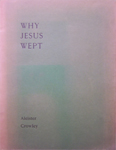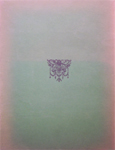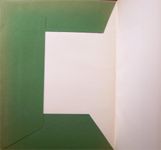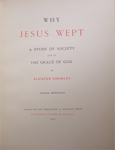100th
MP

|
THE
100th
MONKEY
PRESS |
|
|
|
Limited Editions by Aleister Crowley & Victor B. Neuburg |
|
Bibliographies |
|
Download Texts
»
Aleister
Crowley
WANTED !!NEW!!
|
|
WHY JESUS WEPT (Fourth Impression) |
|
Image Thumbnails |
||||||||||||||||||||||||||||||||||
|
Title: |
Why Jesus Wept. A Study of Society and of The Grace of God. |
|
||||||||||||||||||||||||||||||||
|
Variations: |
|
|||||||||||||||||||||||||||||||||
|
Publisher: |
Society for the Propagation of Religious Truth (S.P.R.T.).1 |
|||||||||||||||||||||||||||||||||
|
Printer: |
Philippe Renouard, 19 rue des Saints Peres, 19, Paris.1 |
|||||||||||||||||||||||||||||||||
|
Published At: |
Boleskine, Foyers, Inverness.1 |
|||||||||||||||||||||||||||||||||
|
Date: |
1905.1 |
|||||||||||||||||||||||||||||||||
|
Edition: |
Fourth Impression.1 |
|||||||||||||||||||||||||||||||||
|
Pages: |
xii + 80 + ii.1 |
|||||||||||||||||||||||||||||||||
|
Price: |
Priced at 21 shillings.2 |
|||||||||||||||||||||||||||||||||
|
Remarks: |
Title page printed in black and red and states “Fourth Impression.” The title page additionally states the publisher as “Society for the Propagation of Religious Truth”, “Boleskine Foyers Inverness.” The second, third and fourth impressions are missing the following items present in the first and fifth impressions: - Advertisement for the book - Letter from the author’s mother - Dedicatio Maxima (To his unborn child) |
|||||||||||||||||||||||||||||||||
|
Pagination:1 |
|
|||||||||||||||||||||||||||||||||
|
Contents: |
|
|||||||||||||||||||||||||||||||||
|
Author’s Working Versions: |
||||||||||||||||||||||||||||||||||
|
Other Known Editions: |
|
|||||||||||||||||||||||||||||||||
|
Bibliographic Sources: |
|
|||||||||||||||||||||||||||||||||
|
Comments by Aleister Crowley: |
The intensity of my repulsion makes me suspect that I wanted to make love to her and was annoyed that I was already in love. The gospels do not tell us whether the man who possessed the pearl of great price ever had moments of regret at having given up imitation jewelry. One always subconsciously connects notoriously vile women who flaunt their heartless and sexless seduction with the possibility of some supremely perverse pleasure in nastiness. However, my surface reaction was to shake the dust of Colombo from my feet and to spend my two days in Kandy in writing Why Jesus Wept. The title is a direct allusion to the ladies in question. I prefaced the play with five dedications to (1) Christ, (2) Lady Scott, (3) my friends (Jinawaravasa, whom I had met once more in Galle, and myself), (4) my unborn child, and (5) Mr. G. K. Chesterton. (He had written a long congratulatory criticism of my The Soul of Osiris.) The idea of the play is to show a romantic boy and girl ambushed and ruined by male and female vampires. It is an allegory of the corrupting influence of society, and the moral is given in the final passage:
(This play has been analysed in such detail by Captain J. F. C. Fuller in The Star in the West that it would be impertinent of me to discuss it further.) — The Confessions of Aleister Crowley. New York, NY. Hill and Wang, 1969. Page2 384-385. ______________________________
My activities as a publisher were at this time remarkable. I had issued The God-Eater and The Star & the Garter through Charles Watts & Co. of the Rationalist Press Association, but there was still no such demand for my books as to indicate that I had touched the great heart of the British public. I decided that it would save trouble to publish them myself. I decided to call myself the Society for the Propagation of Religious Truth, and issued The Argonauts, The Sword of Song, the Book of the Goetia of Solomon the King, Why Jesus Wept, Oracles, Orpheus, Gargoyles and The Collected Works. — The Confessions of Aleister Crowley. New York, NY. Hill and Wang, 1969. Page 406. ______________________________
Why Jesus Wept exhibits love as the road to ruin. It is the sentimental point of view about it which is the catastrophe of Sir Percy’s career. — The Confessions of Aleister Crowley. New York, NY. Hill and Wang, 1969. Page 557. |
|||||||||||||||||||||||||||||||||
|
Reviews: |
It is a work which, as far as pious innocence is concerned, should be kept strictly under lock and key. . . . The strange mingling of ribaldry, indecency, poetry, and wit, could be perpetrated by no one but Mr. Crowley; and certainly no other author would issue, under his own name, such a ruthless violation of conventionalities. The display of Mr. Crowley’s rampant virility does not always take a commendable turn, and many readers will regret that his genius has been given so loose a range. . . . It is possible that electric shocks of this nature may prove beneficial in some cases. —The Literary Guide, date unknown. |
|||||||||||||||||||||||||||||||||



